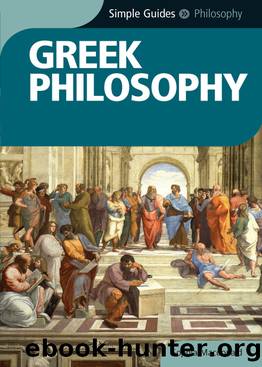Greek Philosophy--Simple Guides by Sophia Macdonald

Author:Sophia Macdonald [Macdonald, Sophia]
Language: eng
Format: epub
ISBN: 978-1-85733-641-2
Publisher: Kuperard
Published: 2011-07-26T00:00:00+00:00
The Atomists
* * *
We tend to yoke together the Atomist philosophers, Leucippus and Democritus, like Laurel and Hardy or, more appropriately perhaps, Crick and Watson, the discoverers of the structure of DNA. Greek historians of philosophy did so too, so much so that it is hard for us to identify the specific contribution of each, though there is a rough consensus that Leucippus was the âinventorâ or originator of atomism and his student Democritus was responsible for the detailed working out of the theory. We cannot be sure exactly how â or even where â they collaborated, since the evidence that Leucippus ever visited or settled in Abdera on the Thracian coast, where Democritus lived, is debatable, and any evidence that Democritus ever visited Leucippus in his home city is absent.
In fact we know practically nothing about Leucippus; even his birthplace is disputed. It was probably Miletus, though it may have been Elea. He was active around 440 BCE, but we do not know his dates of birth or death. Simplicius said that he had âsomething in commonâ with Parmenides but took a contrary path to those of Parmenides and Xenophanes about âwhat existsâ.
We know a little more about the long-lived and immensely learned Democritus (c. 460âc. 370 BCE). He was probably the most prolific Greek philosopher after Aristotle (who thought highly of his work), and the disappearance of the vast majority of his writings is a great loss. He wrote on ethical subjects (contentment, manliness or virtue, wisdom); on natural science (a vast range of topics ranging from a description of the whole world to treatises on flavours and colours); on various natural phenomena such as the heavens, the atmosphere, fire, sounds, plants and animals; on mathematics, literature, medicine and even farming. He acquired the nickname of âthe Laughing Philosopherâ â and in later ages was often paired with the âweepingâ Heraclitus â because he set great value on cheerfulness or contentment in his ethical writings, defining the general goal of life as joy, contentment or tranquillity, and locating it in the soul. But it is above all for the theory of atomism that both he and Leucippus are remembered.
From the âseedsâ of Anaxagoras, it was not an impossibly large leap to the postulation of some kind of elemental particle. However, the Atomists started off from the one thing Anaxagoras refused to countenance: an indivisibly small unit of matter.
âAtomâ means, literally, âuncuttableâ, that is, indivisible. Leucippus proposed that the universe consists of two basic constituents: indivisibly small atoms, of which an infinite number (but not an infinite variety) exist, and void or nothingness, which is also infinite, and in which the atoms move eternally. There is âa limitless quantity of shapes among them (since there is no more reason for them to have one shape than another)â. From Democritus (via Aristotle) we learn that âthe substances are so small that they escape our sensesâ, though they can differ in size, shape, order and position. The atoms move in the
Download
This site does not store any files on its server. We only index and link to content provided by other sites. Please contact the content providers to delete copyright contents if any and email us, we'll remove relevant links or contents immediately.
The remains of the day by Kazuo Ishiguro(8961)
Tools of Titans by Timothy Ferriss(8357)
Giovanni's Room by James Baldwin(7313)
The Black Swan by Nassim Nicholas Taleb(7097)
Inner Engineering: A Yogi's Guide to Joy by Sadhguru(6780)
The Way of Zen by Alan W. Watts(6589)
Asking the Right Questions: A Guide to Critical Thinking by M. Neil Browne & Stuart M. Keeley(5747)
The Power of Now: A Guide to Spiritual Enlightenment by Eckhart Tolle(5740)
The Six Wives Of Henry VIII (WOMEN IN HISTORY) by Fraser Antonia(5492)
Astrophysics for People in a Hurry by Neil DeGrasse Tyson(5172)
Housekeeping by Marilynne Robinson(4430)
12 Rules for Life by Jordan B. Peterson(4298)
Double Down (Diary of a Wimpy Kid Book 11) by Jeff Kinney(4257)
The Ethical Slut by Janet W. Hardy(4235)
Skin in the Game by Nassim Nicholas Taleb(4231)
Ikigai by Héctor García & Francesc Miralles(4228)
The Art of Happiness by The Dalai Lama(4118)
Skin in the Game: Hidden Asymmetries in Daily Life by Nassim Nicholas Taleb(3985)
Walking by Henry David Thoreau(3948)
